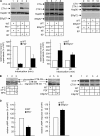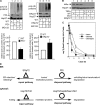Protein disulfide isomerase-like proteins play opposing roles during retrotranslocation
- PMID: 16785320
- PMCID: PMC2063911
- DOI: 10.1083/jcb.200602046
Protein disulfide isomerase-like proteins play opposing roles during retrotranslocation
Abstract
Misfolded proteins in the endoplasmic reticulum (ER) are retained in the organelle or retrotranslocated to the cytosol for proteasomal degradation. ER chaperones that guide these opposing processes are largely unknown. We developed a semipermeabilized cell system to study the retrotranslocation of cholera toxin (CT), a toxic agent that crosses the ER membrane to reach the cytosol during intoxication. We found that protein disulfide isomerase (PDI) facilitates CT retrotranslocation, whereas ERp72, a PDI-like protein, mediates its ER retention. In vitro analysis revealed that PDI and ERp72 alter CT's conformation in a manner consistent with their roles in retrotranslocation and ER retention. Moreover, we found that PDI's and ERp72's opposing functions operate on endogenous ER misfolded proteins. Thus, our data identify PDI family proteins that play opposing roles in ER quality control and establish an assay to further delineate the mechanism of CT retrotranslocation.
Figures





References
-
- Ellgaard, L., and A. Helenius. 2003. Quality control in the endoplasmic reticulum. Nat. Rev. Mol. Cell Biol. 4:181–191. - PubMed
-
- Fujinaga, Y., A.A. Wolf, C. Rodighiero, H. Wheeler, B. Tsai, L. Allen, M.G. Jobling, T. Rapoport, R.K. Holmes, and W.I. Lencer. 2003. Gangliosides that associate with lipid rafts mediate transport of cholera and related toxins from the plasma membrane to endoplasmic reticulum. Mol. Biol. Cell. 14:4783–4793. - PMC - PubMed
-
- Karin, M., and Y. Ben-Neriah. 2000. Phosphorylation meets ubiquitination: the control of NF-κB activity. Annu. Rev. Immunol. 18:621–663. - PubMed
MeSH terms
Substances
LinkOut - more resources
Full Text Sources
Other Literature Sources
Research Materials
Miscellaneous

